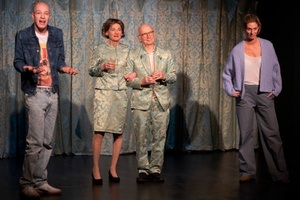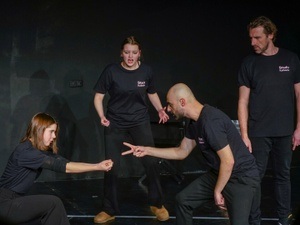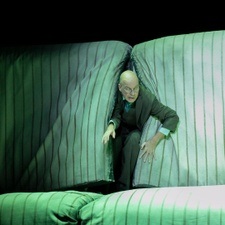Biedermann und die Brandstifter
In the organizer's words:
Biedermann und die Brandstifter - by Max Frisch - Premiere on October 1, 2022 - Schauspielhaus, Kleines Haus
Again and again the city is ravaged by conflagrations. "Arson!" they say. Peddlers are said to have done it. "They should be hanged!" says the hair tonic manufacturer Gottlieb Biedermann. Ambition, vanity and striving for power are among his character traits. He would not describe himself as an inhuman being. Not even when he throws out the employee Knechtling, who demands a rightful financial share in an invention. Or when he threatens Knechtling with a lawyer and shouts after him to lie down under the gas stove, which he promptly does.
In Biedermann's own opinion, it is a sign of humanity that he takes in the peddlers Schmitz and Eisenring, who are looking for a roof over their heads. Neither Biedermann nor his wife Babette can do anything about their brazen jokes and impertinent demands. The couple allows themselves to be wrapped around their fingers by stories about Schmitz's difficult childhood and Eisenring's missed opportunities in life. Whether these sentimentalities are based on facts or are part of the strategy of the two guests remains at least questionable. Mr. and Mrs. Biedermann are unwilling to admit that their character flaws open the door to evil, even when Schmitz and Eisenring openly identify themselves as arsonists, drag barrels of gasoline into the attic and talk shop about the best ignition mechanisms. After all, "the best and safest camouflage" of all agitators and agitators is still "the bare and naked truth," as it says in the play. "Because nobody believes it."
Director Adrian Figueroa, who premiered Dawn King's "The Tribunal" at the Düsseldorf Schauspielhaus in the 2021/2022 season, relates Max Frisch's 1958 "Lehrstück ohne Lehre" to the present without interfering with the text. For what literary critic Hellmuth Karasek wrote decades ago with regard to the play's epilogue still applies today: "Terror can be blunt as soon as it has implicated the citizen, made him complicit. He can rely on the fact that the victim will not believe what he suspects. Cowardice still closes eyes and ears to the truth." The question remains, who do we recognize today in Max Frisch's parable, who do we identify as the arsonist, who as the Biedermann. And who as a chorus of firefighters, in a time when terms like "conscience" and "morality" have negative connotations and "do-gooder" is a dirty word.<<













